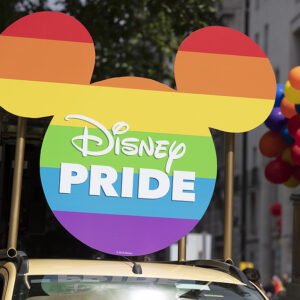The culture wars have taken their shots at Disney. It’s a direct hit! They’ve been forced to become a political voice against policies their consumers supposedly despise.
Disney faces a tug of war over corporate values. It is taking a knee for opposing sides of the value equation. It is quite interesting to watch. The risk to Disney’s brand has never been greater.
On one side, you have self-absorbed activists in the United States who feel the end is near for them. They got Disney to speak out against a Florida gender and sexuality education law. Pressured, Disney CEO Bob Chapek wants to meet with Florida Gov. Ron DeSantis to talk about his company’s opposition. This is Disney’s American flank in the culture war.
On the other side, it’s China. Someone, please tell Disney that there is no Shanghai Gay Pride parade in the works. Well, in that case, what is Disney doing there?
The social justice activist, which Disney views as representative of its customer base, is listened to in the U.S. market. But they have no voice at all in Disney’s China market. American activist consumers can say they don’t care what Disney does in China — “You must save the planet in the U.S., but it’s fine if your contractors throw T-shirt printing chemicals down the Yangtze River.”
If you’re adamantly pro-this in the United States, why be adamantly silent about the same issue abroad? Such a posture is unsustainable. That is especially true if U.S. consumers demand the same values be expressed worldwide.
It’s a total pickle for Disney.
Late last year, a Disney shareholder called The National Legal and Policy Center (NLPC) and asked Disney’s board to produce an annual report on its human rights protections in its supply chain. The Chinese province of Xinjiang is a big cotton grower. Xinjiang cotton is banned from U.S. supply chains due to concerns over prison labor. Uyghur and other Muslims are held in captivity there as part of China’s domestic war on terrorism. The State Department calls China’s Uyghur policies a “genocide.” The NLPC wants to be certain a social justice warrior like Disney would make sure no prison labor goes into its clothing line.
Disney’s board said no to that idea. The Securities and Exchange Commission then said Disney had to put the proposal up for a shareholder vote. They did. And on March 9, 34 percent of Disney shareholders agreed that such a report should be produced. They lost, however. No need for evidence of forced labor-free Boba Fett and Fennec Shand T-shirts.
That a third of Disney shareholders wanted this action in China is interesting because it’s the same as the 34 percent of people opposed to Florida’s sex education law for minors, according to Pew Research.
The Chinese can’t really protest their government. It’s not a free society. That shields Disney, and other corporate actors. But how long can Disney put up with its dual stance of being woke at home, asleep in China? My guess is not much longer.

